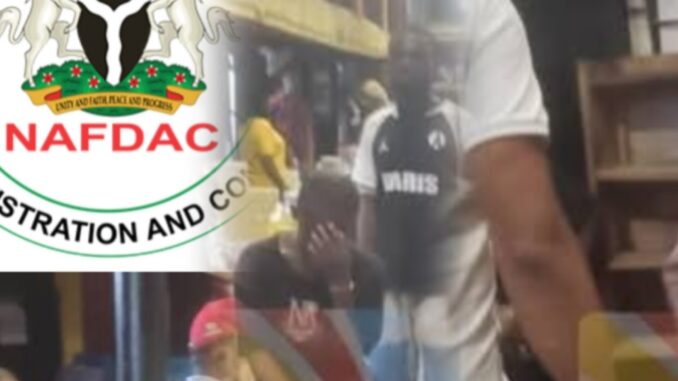
By Newsie Events Media :
The bustling Onitsha Drug Market, one of West Africa’s largest pharmaceutical trade hubs, has become the epicentre of a heated controversy pitting federal regulators against thousands of local traders. The National Agency for Food and Drug Administration and Control (NAFDAC) is under fire after being accused of forcefully extorting millions of Naira from traders during a recent enforcement operation.
But NAFDAC is pushing back, insisting the accusations are unfounded and its actions entirely lawful.
At the heart of the outrage is a civic watchdog group, the International Society for Civil Liberties and Rule of Law (Intersociety), which has demanded not only a full refund of the allegedly extorted funds—but with an additional 20% interest—but also the immediate resignation of key NAFDAC officials, including its Director General Prof. Mojisola Adeyeye and South-East Director Dr. Martins Iluyomade, to allow an impartial probe.
In a strongly worded statement signed by Board Chairman Emeka Umeagbalasi and other officials, Intersociety condemned what it described as a campaign of “militarist, extortionist and collective punishment” inflicted on traders who, for more than 90 days, were locked out of their shops in what the group calls a gross abuse of regulatory power.
“Thousands of traders were coerced into paying arbitrary charges by May 29, 2025,” Intersociety claimed. “No justification exists for such forced collections from citizens denied access to their lawful businesses for over three months.”
Despite submitting more than 10 petitions to government bodies—including Governor Charles Soludo, the Federal Ministry of Health, and legislative health committees—Intersociety said only Senator Tony Nwoye and Hon. Afam Ogene, Speaker of the Anambra State House of Assembly, acknowledged receipt of their grievances.
The group also drew attention to what it called a disturbing new trend: the alleged weaponisation of the Cyberstalking Act. It criticised NAFDAC for reportedly using the law to target social media activist Martins Vincent Otse, better known as “VeryDarkMan,” accusing him of incitement and collusion with counterfeit drug dealers. Intersociety denounced such actions as “state-sanctioned terror.”
Still, NAFDAC remains firm in its stance. At a press briefing in Lagos, DG Prof. Adeyeye defended the agency’s actions, asserting that all charges levied were lawful, gazetted, and tied to genuine public health violations uncovered during a sweeping operation carried out between February 9 and March 27, 2025.
“No trader was unfairly targeted,” Adeyeye said. “Every fine imposed stemmed from violations—ranging from sale of unregistered drugs to breaches in storage and distribution practices. We’re not in the business of witch-hunts. We’re in the business of saving lives.”
NAFDAC reported that over N1 trillion worth of hazardous drugs were seized and removed from circulation during the operation. The agency also claimed it granted significant fine reductions following appeals—bringing, for instance, a N5 million penalty down to N200,000 in some cases.
In a move meant to restore order, NAFDAC officially reopened the Ogbo Ogwu market on March 9, 2025, allowing more than 2,500 compliant traders to return to their shops.
“This isn’t about permanent closure; it’s about reform. We’re rebuilding the system so Nigerians can trust the drugs they use,” Adeyeye stated.
Long known for being a hub of counterfeit pharmaceuticals, Ogbo Ogwu had been under NAFDAC’s surveillance for years. Adeyeye said the time had come to act decisively.
“We’re talking about fake blood pressure drugs, expired antibiotics, and dangerous narcotics,” she said. “These products kill. Our job is to stop them from reaching the public—shop by shop, warehouse by warehouse.”
The agency reaffirmed its commitment to enforcing quality control across Nigeria’s pharmaceutical landscape, promising continued surveillance to purge the market of “killer drugs.”
Meanwhile, Intersociety clarified its stance: it stands fully with genuine traders—over 90% of the market, by its count—but not with sellers of fake or substandard drugs.
With tensions high and the stakes even higher, Nigerians now watch closely to see if transparency will prevail—or if the country’s regulatory system is itself in need of a cure.
NEWSIE EVENTS MEDIA TEAM Follow Us On Twitter: @NewsieEvents, Instagram: newsieevents, Facebook: Newsie Events (Subscribe to our YouTube Page: Newsie Eventsng. LinkedIn Newsie Events